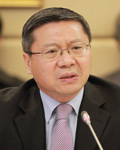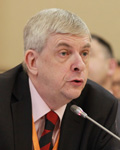|
There is no question that China is growing more powerful with the rapid development of its national strength, subtly influencing the world in both visible and invisible ways. How should China interact with the world throughout its steady rise, and how should the world live with a growing China? During the Fifth World Forum on China Studies held in Shanghai in late March, Chinese and overseas scholars shared their views on China's relations with the international system in the coming decade. Excerpts follow:

Zhang Weiwei
(a professor with the Shanghai-based Fudan University and a senior fellow with the Center for Asian Studies in Geneva):
With further rise over the next decade, China should develop in a big way its political narrative. China's idea of "good governance vs. bad governance" can better explain this complicated world than the Western idea of "democracy vs. autocracy." China's concept of meritocracy helps overcome the various defects associated with the blind faith in elections. China's philosophy of the mixed economy challenges the convention of the Washington Consensus. China's political narrative is expected to interact and compete with the existing Western political narrative, and only through this kind of interaction and competition, can China develop itself more smoothly, and can the future of the world be more just, peaceful and convergent.

Vairo Lionel
(CEO of Luxembourg-based CEC Consulting and a former French diplomat):
The world has entered an age of de-westernization caused by a major crisis of powerlessness. Western powers have overused their power in all respects: unjustified wars and invasions, inability to overcome a major economic and financial crisis because the real power eluded them and concentrated in the hands of financial invisible actors, called "the markets," and demands addressed to rising powers to pay the debt of climate and environmental damages after two centuries of rapid industrialization of the West.
A few rising powers, here and then, have also started to question the dominant Western liberal ideology, even for those having historically strong links with the United States and Europe like India or Brazil. Still, they started to set up new international arenas, like BRICS or the East Asia Summit, with or without the participation of Western powers, in order to join their resources so as to gradually change the rules that were defined by the West after World War II.
Within this new framework of international relations, China is most probably the major actor in front of the West. Its economic and financial power makes it impossible for Western countries to ignore China's feelings or policies. But it also raises a main question to be answered: Does China progressively move to Westernization as it is often presented in Western media and analysis, or does China prepare the world for de-westernization by inventing a new model of political rule, economic development and society? For the future of the world, the answer to this question will have a decisive influence.
China's soft power is presently very weak, mostly based on its economic strength. Soft power is all about dreaming. In most countries around the world, and more specifically in developing countries, young people dream about America, as it used to be for young Europeans a few decades ago. Their understanding of America is extensively the result of American movies' influence on their imagination. For the time being, almost no young people dream about China, even when they are seriously interested in Chinese culture or China's path to development. It has no impact on their imagination; it rather influences their vision of development possibilities, without the dream. All the challenge for China maybe relies on this dimension, which has not been taken into consideration until now.

Geeraerts Gustaaf
(Director of the Brussels Institute of Contemporary China Studies):
The constellation of world power is changing into a multilayered polar structure consisting of two tiers. The United States, which is still the most important single economy in the world and also remains the world's largest military power, is in the first tier. The second occupant of the first tier is China due to its growing economic weight and expanding military clout. The second tier comprises most regional powers like the Group of 20 members. They matter in a number of important international issues but are lacking in comprehensive power.
China's ascent engenders a fundamental change in yet another sense. Because it is different in terms of culture, history, economy, political system and stage of development, it poses a challenge to the era of Western hegemony at the level of system values and rules of the game. China's distinct identity makes it rather unlikely that Beijing will easily adapt to systemic responsibilities as they were spelled out by key Western players. China's rise is not only changing the distribution of power in the system, it also engenders a change in the distribution of identities.
As its economic clout grows worldwide and its political influence increases well beyond its borders, Beijing is becoming more self-assured, spelling out its own discourses of modernity and developing its particular narratives of global governance ever more confidently. Yet, at the same time China is already firmly integrated in current international regimes and benefits from their smooth functioning. Beijing actually has a keen interest in seeing that international rules and institutions function effectively. The main challenge for China's foreign relations is to strike a balance between the idiosyncratic and the universal.
|
